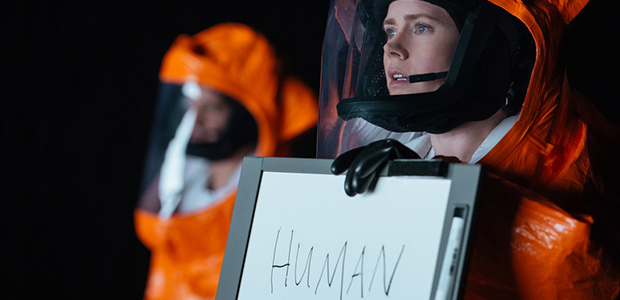
Arrival connects in profound and devastating ways its themes of empathy and communication. On the surface a science fiction film about alien landings and first contact, it gently peels away to force you to come to terms with its treatise on memory and time and how it shapes and molds us into the beings that we are.
We’ve been conditioned to believe by years of Hollywood programming that if aliens ever landed, we’d know their intentions and get on with the business of engaging with them almost instantly. Arrival comes as a thought-provoking exercise in deconstructing the challenges of learning a new language, one that doesn’t have any similarities to those known to man. In the films opening moments we are introduced to Dr. Louise Banks (an extraordinary Amy Adams), a linguistics professor with a valid military clearance. She is tasked with one objective – decipher the true intent of the beings that have landed.
This assignment proves to be much harder than the military grunt around her seem to understand. Her approach is measured and patient – she immerses herself into learning their language and in some ways, as a consequence, gains their trust. If for nothing else, this portion of the film alone is more fascinating than anything you’ve likely experienced this year. It is believable and fleshed out, starting with alphabets and becoming more complex, employing imagery and gestures. But the film doesn’t stop here. It has greater ambitions, a scope so grand, an ultimate goal so extraordinary, it invites us to question what we think of language and it’s ramification on existence.
Truth be told, there hasn’t been a sci-fi film this good since Interstellar. Heck it’s probably the best mainstream film of the year. Great science fiction is great not just by design but because it has a beating heart at its core that understands what it means to be human. For that reason, Interstellar resonated not because it was about cosmic flights into unknown galaxies, but because it was ultimately about parental guilt at choosing work over family. Arrival is much the same. It has a human conundrum that quietly moved me – a woman who discovers something and must make, what is to her, a shattering choice.
Communication is as much about listening, through which we ultimately learn. This may seem trite and obvious but in the message of the film it has deeper and intense implications. Once it is revealed what the purpose of these beings is (and it is quite heady, so brace yourself for it while viewing), even the films elliptical structure, often disjointed and frequently employing the use of fragments of memory that seem distant, starts to make sense. And just like the film changes Louise’s perception of the world, Arrival is likely to change yours.
Rating: 



